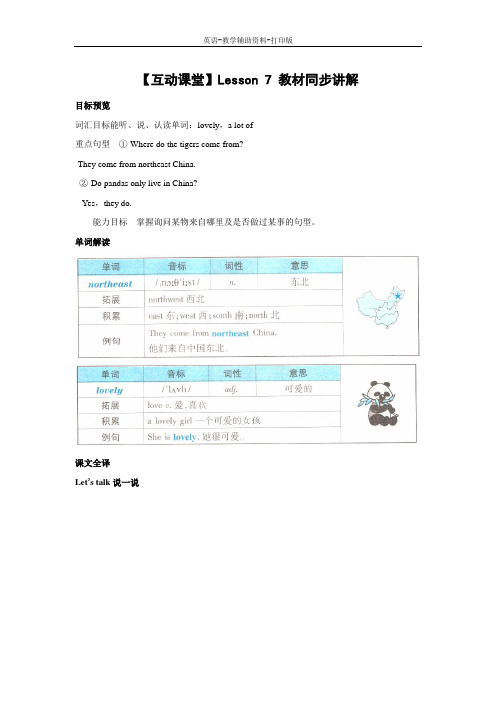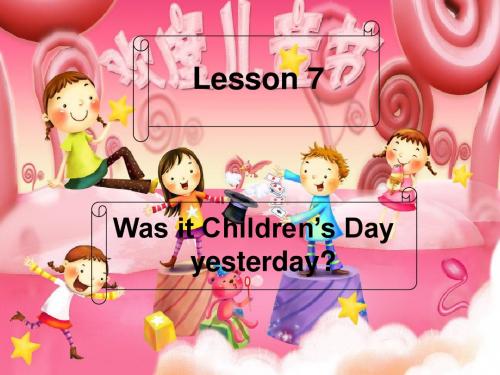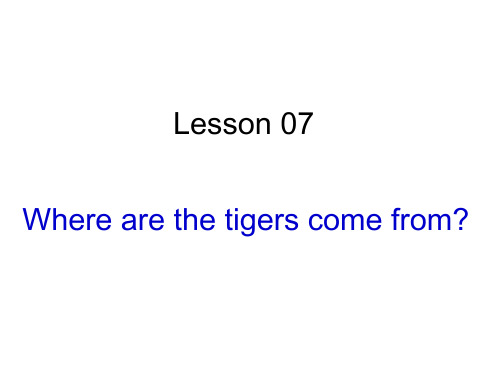2018春六年级科普版英语下册lesson07《where are the tigers come from》ppt课件
科普版六年级下册英语第七课第四课时read

知识点
• • • • What‟s the matter with you? =What‟s wrong with you? not at all 一点也不 play a joke on sb. 和某人开玩笑
复述课文: April Fools’ Day
…1st…… Day.
……
if you …… in ……
Early in the morning, Mike told Mary about an English test.
翻译
• 四月一号是愚人节,在那一天,如果你成 功地捉弄了某人的话,你就大笑着说“四 月傻瓜。” • 迈克:嗨,玛丽,我听说今天上午我们会 有一场英语测试。 • 玛丽:考试?真的吗? • 迈克:真的。 • (一大早,迈克告诉玛丽有关英语测试的 事。)
• • • • • • • fools high tricking late told pupils reviewed(过去式)
按要求完成单词
• • • • • • • laugh(过去式) they(宾格) dear(同音词) surprise(过去式) them(主格) came(原形) let us(缩写)
知识点
• Mary told this news to other pupils. • =Mary told other pupils this news. • tell sth. to sb.把某事告诉某人=tell sb. sth. 告诉某人某事 • 如: He tells a good news to me. • =He tells me a good news. • 他告诉我一个好消息
in.
Her …… ……Mike.
复述课文: April Fools’ Day
科普版-英语-六下--Lesson 7 教材同步讲解

【互动课堂】Lesson 7 教材同步讲解目标预览词汇目标能听、说、认读单词:lovely,a lot of重点句型①-Where do the tigers come from?-They come from northeast China.②-Do pandas only live in China?-Yes,they do.能力目标掌握询问某物来自哪里及是否做过某事的句型。
单词解读课文全译Let’s talk说一说学习要点①a lot of许多,为固定搭配。
a lot与a lot of的区别:a lot:副词,意为“很,非常”,放在所修饰的动词后,在含义上相当于“very much”。
例:I miss you a lot.我非常想念你。
a lot of:相当于“lots of”,意为“许多;大量”,后面接可数名词复数或不可数名词。
例:There are a lot of people in the park.公园里有许多人。
Yesterday he drank a lot of milk.昨天他喝了许多牛奶。
②该对话是对某物/人来自哪里的询问及回答。
问句句型结构:Where do/does+主语+come from?……来自哪里?答语:主语+ come(s)from+地点,……来自……where意为“哪里”,询问地方。
当主语为第三人称或单数名词时,助动词应使用does,而答语中也应使用comes;其他情况下则用do和come。
该对话的问句及答语都有同义句型,分别为“Where+be动词+主语+from?”和“主语+be动词+from+地点.”。
例:-Where do you come from?=Where are you from?你来自哪里?-I come from China.=I'm from China.我来自中国。
③too的自我介绍大家好,“我”是英文单词too,“我”有两个名字,一起来看看吧!“我”的第一个名字是“也”,经常位于句子的末尾,句子后面有了“我”,意思就会发生小小的变化。
科普版英语六年级全册课文(电子档)(K12教育文档)

科普版英语六年级全册课文(电子档)(word版可编辑修改)编辑整理:尊敬的读者朋友们:这里是精品文档编辑中心,本文档内容是由我和我的同事精心编辑整理后发布的,发布之前我们对文中内容进行仔细校对,但是难免会有疏漏的地方,但是任然希望(科普版英语六年级全册课文(电子档)(word版可编辑修改))的内容能够给您的工作和学习带来便利。
同时也真诚的希望收到您的建议和反馈,这将是我们进步的源泉,前进的动力。
本文可编辑可修改,如果觉得对您有帮助请收藏以便随时查阅,最后祝您生活愉快业绩进步,以下为科普版英语六年级全册课文(电子档)(word版可编辑修改)的全部内容。
Lesson 1 Are you going to have a birthday party?Let’s talk(L=Lulu, T= Tom)L: What day is it today?T: It’s Wednesday.L: My birthday is coming.T: When is your birthday?L: Next Sunday.T: Are you going to have a birthday party?L: Yes, I am。
I’m going to have a party at home next Sunday evening。
Would you like to come?T: Sure。
I’d love to. Are you going to ask Eve to come?L: Certainly。
Make and sayA holiday planMay Day is coming。
What are you going to do. Please tell me your plan.On May 1st, I’m going to visit my friends。
On May 2nd, I’m going to take swimming lessons.On May 3rd, I'm going to help my mum do some washing。
科普版下册六年级unit7课件

一般过去时
• 一般过去时态: • 一般过去时表示过去某个时间发生 的动作或存在的状态。常和表示过 去的时间如:last year(去 年),last week(上周),last Sunday(上周日), yesterday(昨天)等连用。
一般过去时陈述句基本结构
I +was He/she/it(单)+was You/they/we(复)+were
Be 动词类(状态)
陈述句
主+V过去式 行为动词类(动作) They liked game.
They came here.
What’s the date today?(今天)
What was the date yesterday?(昨天)
• 6月1日 • June 1st
--- It was June 1st. --- It was Children’s day.
What’s the date today?(今天) What was the date yesterday?(昨天) --- It was April 1st. --- It was April Fools’ day.
• • • • • • • •
今天是几号? What’s the date today? 今天是 It’s 明天是几号? What’s the date tomorrow? It’s 今天、昨天的日期我们都会问答,大家 想一下:昨天是几号以及其答语应该怎 样说?
• 6月1日 • June 1
• 4月1日 • April 1
• 4月1日
Hale Waihona Puke April 1st• • • • • • • •
Teachers’ Day---9月10日 What the date yesterday? It was … It was … National Day---10月1日 What the date yesterday? It was … It was…
2018春六年级科普版英语下册lesson07《where are the tigers come from》ppt课件

今天是星期一。下星期日是汤姆 的生日。他想举办一场生日聚会。 现在是星期二夜晚。汤姆正在给 他的朋友们写电子邮件。他邀请 他们来参加聚会。 今天是星期四。汤姆正在电话中 和露露交谈。他正在邀请她参加 聚会。
现在是星期六早上。汤姆在商店 里。他正在买一些食物和饮料。 现在是星期六下午。东东和露露 在商店。他们正在为汤姆买一件 礼物。 今天是星期日。现在是早上七点 半。许多朋友来参加汤姆的生日 聚会。他们向汤姆唱生日快乐歌。 汤姆非常高兴。
V:--What do the animals eat? G:--Tigers and bears eat_______. meat Elephants eat_______. plants
V:--Wow!The pandas are lovely!
--Do they only live in China? G:--Yes.they____. do
many others=many other animals "许多其他的动物”
V:Where do the tigers cre the tigers from?
G:They come from northeast China. They are from northeast China.
是的,它们仅仅生活在中国。它们是我 最喜爱的动物。
我也很喜欢它们。 咱们给它们照些照片吧。 好的。
• 表示“多少”和“第几”的词,叫数词。 • 数词分为基数词和序数词两种。 • 基数词: 1,2,3,4........ • 基数词 1-12 是独立单词,需逐个记忆。
序数词规则
• 1.大多数在词尾直接加-th,如:four-fourth ,ten-tenth • 2.第一,第二,第三是不规则的变化,即: one-first, two-second,three-third,也经常简写为:1st, 2nd , 3rd • 3.基数词 five, eight, nine, twelve 稍有变化,即:eighteighth,nine-ninth,five-fifth,twelve-twelfth • 4.序数词前一般加定冠词the,如: the second floor
新课标《英语》科普版六年级下册课文翻译

Lesson 1 I’m not feeling well第一课我不舒服Let’s talk(第一段)妈妈:汤姆,怎么了?汤姆:妈妈,我不舒服。
妈妈:你感冒了吗?汤姆:是的,我觉得是。
你能给我些水吗?妈妈:给你。
汤姆:谢谢你,妈妈。
(第二段)妈妈:汤姆,你必须要去看医生。
汤姆:好的,妈妈。
妈妈:外面天气冷,你必须穿上你的外套。
汤姆:好的,妈妈。
你可以把我的外套递给我吗?妈妈:给你。
汤姆:谢谢你,妈妈。
妈妈:把你们老师的电话号码告诉我。
我要给他打电话,告诉他你生病了。
汤姆:好的,给你。
Let’s learn(左上角文本框中)-我觉得不舒服。
-你怎么了?-我感冒了。
你能给我些水吗?-好的。
Ask and answer-怎么了?-我发烧了,你能给我些水吗?-给你。
-谢谢。
Listen and say萨姆:嗨,汤姆。
我是萨姆。
今天下午有一场足球赛。
你想看吗?汤姆:不了,谢谢。
我得了重感冒。
萨姆:哦。
你应该多喝水多休息。
汤姆:是的,我现在就躺在床上呢。
萨姆:你可以在电视上看那场足球赛。
汤姆:是的,我爸爸会陪着我的。
萨姆:太棒了!Read一个好习惯P6丹经常晚睡晚起。
终于有一天他病倒了。
他头痛得厉害,在夜晚无法入睡。
所以他去看医生。
“哦,你看起来很疲惫。
怎么了?”医生问道。
“我头痛得厉害,而且夜晚无法入睡,”丹说。
P7“你通常什么时候睡觉?““我通常12点后睡觉。
““你应该在10点之前睡觉。
睡前喝些牛奶。
我确定你会睡得好也会很快好起来。
“从那时起,丹就早睡,并且身体很快好了起来。
早睡早起是个好习惯。
Lesson 2 Did you play basketball yesterday?第二课你昨天打篮球了吗?Let’s talk露露:你好,汤姆!通常你周日下午都做什么?汤姆:我经常打篮球。
露露:你昨天打篮球了吗?汤姆:不,我没有。
我去看望了一个朋友。
露露:你过得开心吗?汤姆:是的,很开心。
我的朋友喜欢摄影。
他给我看了许多照片。
科普版小学英语六年级下册Lesson7Where do the tigers come from
听力材料:
2.Hello,I’m Dongdong.I come from Beijing.I get up at eight.I usually go to school by bike.I like skating.
3.Hi,I;m Yanyan.I come from g Kong.I get up at six thirty.I usually go to school by car.I like fishing.
lways unday ften ate ometimes sually
看图并找出相应的单词。(不要忘记 连线,完成后向大家展示你的答案。)
听首歌放松一下!
通读Read,完成下列问题。 1.What day is it today? 2.When is Tom’s birthday? 3.What is Tom doing on Tuesday evening? 4.What is Tom doing on Thursday? 5.What is Tom doing on Saturday morning? 6.Where are Dongdong and Lulu? 7.What do Tom’s friends do for tom on Sunday evening? 8.Is Tom happy?
lesson7
Where do the tigers come from?
教学目标: 复习稳固一般现在时、现在进行时和There be句型。 教学重点: 熟练掌握一般现在时、现在进行时和There be句型。 教学难点: 一般现在时的人称变化注意事项以及频率词的使用。
来自
There be句型,有…… There be句型的一般疑问句,be动词提前。
六年级英语下册第七课
Learning aims:
1.“四会”词句:size, a clothes shop, slippers ,sunglasses, sneakers. 2.掌握询问衣服颜色、尺寸大小、价钱等的英语 表达方法。
这节课我们学习了哪些知识? 这节课我们学习了哪些知识?
What can I do for you?=Can I help you? I’m looking for …我正在找…… What size does she wear?你要多大号的? What colour do you like? like?你要什么颜色? How much is it? 它多少钱? Here is the money.给钱。 Thank you.
1.Copy the news 5 times. 2.Recite the text.
Thank you! Bye-bye!
a clothes shop
slippers
sneakers
sunglassesBiblioteka largemiddle
small
size
Answer the questions: 1.How many people are there in this dialogue? 2.Who are they? 3.What does Mrs Zhang want to buy? 4.What size does Mrs Zhang ’s daughter wear? 5.What colour does she like? 6.How much is it?
:
Saleswoman: What____ I do for you? ___ can Mrs Li: I am looking for a dress for my daughter. size _____she______? wear Saleswoman: What_____ does Mrs Li: Small. colour Saleswoman: What_______do you like? Mrs Li: Red. Saleswoman: What about this one? How ____ Mrs Li: Oh!It’s very nice._____much is it? Saleswoman: 65 yuan. Mrs Li: Here is the money. Thank you Saleswoman:_____ _____.
科普版六年级下册英语LESSON 7
四、复习句型
1、询问某人的职业? --What do/does +主语+do? --主语+am/is/are +职业(worker/teacher/farmer/cooker/student/driver等 P:What does your father do? He is a teacher. 2.一般现在时的一般疑问句。 1)Do/Does开头的一般疑问句: ----Do/Does +主语+动词原形(动词短语)( +其他)? -----肯定回答:Yes,主语+do/does. 否定回答:No,主语+don’t/doesn’t. p:Does your friend have big eyes? ----Yes,he does. Does Jim like playing ping-pong?---No,he likes playing basketball. 2)there be 句型的一般疑问句的问答: Are there any pandas here? ----Yes,there are some.
2、时间短语
at seven thirty 在七点半 (at+具体的某时刻) in the morning/afternoon/evening 在早上/下午/晚上 ( in+时间段) on Sunday 在周日 On May 23, 2016 在2016年5月23号 on Saturday morning (on+具体的某一天/某一天的某时间段) in +季节/月份/年份/国家 in summer in July in 2012 in China 在中国 next +星期 下周几 next Monday 下周一 last +星期 上周几 last Tuesday 上周二
六年级下册英语教学课件Lesson 7科普版(三起)
Where do the tigers come from ?
Warm-up
Did you have been to the zoo? What animals have you seen? What is your favorite animal?
Let’s talk
elephant
a lot of =lots of “大量的,许多” 修饰可数或不可数名词 many others= many other animals "许多其他的动物”
Read
Questions: 1.When is Tom's birthday? 2.What did he bought in a shop? 3.What time does his birthday party start?
bear
panda
tiger
Questions: 1. What are the animals in Beijing Zoo? 2. Where do the tigers come from? 3. What do tigers and bears eat? 4. What do elephants eat? 5. Are there any pandas in Beijing Zoo? 6. Do pandas only live in China?
Revision
• 动词的第三人称单数的变化规律
1、直接加s 2、以s,x,ch,sh,o结尾的单词,加es 3、辅音字母加y结尾的单词,变y为i+es 4、have-has
1.do-- does 2.go--goes 3.say--says 4.play--plays 5.make--makes 6.write--writes 7.have--has
- 1、下载文档前请自行甄别文档内容的完整性,平台不提供额外的编辑、内容补充、找答案等附加服务。
- 2、"仅部分预览"的文档,不可在线预览部分如存在完整性等问题,可反馈申请退款(可完整预览的文档不适用该条件!)。
- 3、如文档侵犯您的权益,请联系客服反馈,我们会尽快为您处理(人工客服工作时间:9:00-18:30)。
今天是星期一。下星期日是汤姆 的生日。他想举办一场生日聚会。 现在是星期二夜晚。汤姆正在给 他的朋友们写电子邮件。他邀请 他们来参加聚会。 今天是星期四。汤姆正在电话中 和露露交谈。他正在邀请她参加 聚会。
现在是星期六早上。汤姆在商店 里。他正在买一些食物和饮料。 现在是星期六下午。东东和露露 在商店。他们正在为汤姆买一件 礼物。 今天是星期日。现在是早上七点 半。许多朋友来参加汤姆的生日 聚会。他们向汤姆唱生日快乐歌。 汤姆非常高兴。
--Let me take some photos of them.
G=高涛,N=尼克,H=海伦 这是北京动物园。这儿有许多动物—— 大象、熊、老虎和许多其他动物。 这些老虎来自哪里? 它们来自中国东北。 这些动物吃什么? 老虎和熊吃肉。大象吃植物。 这里有一些大熊猫吗? 是的,有一些。看!它们在那儿。 哇!它们真可爱! 大熊猫仅仅生活在中国吗?
V:--What do the animals eat? G:--Tigers and bears eat_______. meat Elephants eat_______. plants
V:--Wow!The pandas are lovely!
--Do they only live in China? G:--Yes.they____. do
The End
Where do the tigers come from?
come from=be from Where are the tigers from?
This is Beijing Zoo.There are a lot of animals here — elephants,bears,tigers and many others.Pandas are my facourite animals. a lot of =lots of “大量的,许多”,修饰 可数或不可数名词
是的,它们仅仅生活在中国。它们是我 最喜爱的动物。
我也很喜欢它们。 咱们给它们照些照片吧。 好的。
• 表示“多少”和“第几”的词,叫数词。 • 数词分为基数词和序数词两种。 • 基数词: 1,2,3,4........ • 基数词 1-12 是独立单词,需逐个记忆。
序数词规则
• 1.大多数在词尾直接加-th,如:four-fourth ,ten-tenth • 2.第一,第二,第三是不规则的变化,即: one-first, two-second,three-third,也经常简写为:1st, 2nd , 3rd • 3.基数词 five, eight, nine, twelve 稍有变化,即:eighteighth,nine-ninth,five-fifth,twelve-twelfth • 4.序数词前一般加定冠词the,如: the second floor
Lesson 07
Where are the tigers come from?
Revision
一般现在时
有一些词作为标志
Revision
Revision
• 动词的第三人称单数的变化规律 1、直接加s 2、以s,x,ch,sh,o结尾的单词,加es 3、辅音字母加y结尾的单词,变y为 i+es 4、have-has
many others=many other animals "许多其他的动物”
V:Where do the tigers come from?.
V:Where are the tigers from?
G:They come from northeast China. They are from northeast China.
• 在第几层,在几楼用 on+the • 在二楼 在三楼 在五楼
ห้องสมุดไป่ตู้
• on the second floor on the third floor on the fifth floor • 在几年级,在几班,要在年级、班级前面 加in • 例如:在六年级 在五班 • in Grade Six in Class Five • 在六年级五班 • in Class Five Grade Six
1,do-- does 3.say--says 5.make--makes 7.have--has 9.cry-- cries 11.wash--washes 12.watch--watches 13.fix--fixes
2.go--goes 4.play--plays 6.write--writes 8.try--tries 10.carry--carries
first second third fourth fifth sixth seventh eighth ninth tenth
第一 第二 第三 第四 第五 第六 第七 第八 第九 第十
eleventh 第十一 twelfth 第十二
课文重点讲解
• Where is Kate? • 回答:某人+be+in/on/at+地点 • She is in the reading room. Where is the reading room? It is on the fifth floor. • 般疑问句 • 1. 用特殊疑问词代替划线部分 She is where. • 2. 变一般疑问句 Is she where? • 3. 把特殊疑问词提前 Where is she(Kate).
